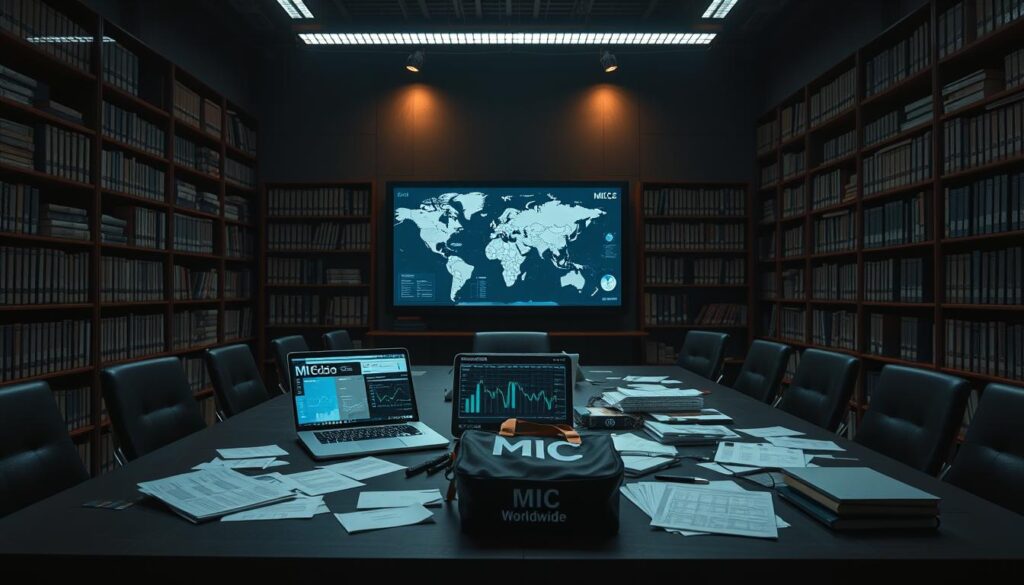For businesses aiming to enter new markets or forge partnerships in Latin America, due diligence investigations are paramount. The region’s unique challenges, such as non-digitized records, demand manual searches and direct visits to registries. Grasping these hurdles is vital for adeptly navigating the due diligence terrain in Latin America, which mandates rigorous investigations.
Due diligence is indispensable for confirming data accuracy and evaluating potential risks. Given Latin America’s largely non-digitized records, a meticulous and detailed approach is required. This article will outline the critical steps and considerations for conducting comprehensive due diligence investigations in the region. It aims to equip businesses with the knowledge needed to make informed decisions when engaging with entities in Latin America.
By undertaking thorough due diligence investigations, companies can mitigate risks and adhere to regulatory standards. These investigations entail a thorough examination of a company’s financial, legal, and operational facets. This provides a comprehensive insight into its capabilities and vulnerabilities. In Latin America, such investigations are imperative for navigating the intricate regulatory environment and avoiding potential hazards.
Key Takeaways
- Conducting thorough due diligence investigations is crucial for businesses expanding into Latin America.
- Due diligence investigations involve a comprehensive review of a company’s financial, legal, and operational aspects.
- Non-digitized records in Latin America require manual searches and personal visits to registries.
- Due diligence investigations help minimize risks and ensure compliance with regulatory requirements.
- Thorough due diligence investigations provide a detailed understanding of a company’s strengths and weaknesses.
Understanding the Latin American Due Diligence Landscape
Carrying out due diligence in Latin America demands a profound grasp of the area’s distinct hurdles and intricacies. The region’s varied regulatory landscapes, differing levels of transparency, and abundance of non-digitized records complicate the process. It is imperative to comprehend the regional regulatory framework and essential documentation needs to guarantee adherence and identify potential hazards.
Entities must grasp the subtleties of corporate investigations in Latin America. The absence of uniform regulations and the disparity in transparency can impede the investigation’s progress. Moreover, the abundance of non-digitized records complicates the retrieval and validation of data, underscoring the necessity for a comprehensive understanding of the regional terrain.
By comprehending the unique challenges and complexities of the Latin American due diligence landscape, entities can more effectively traverse the region. This ensures that their due diligence endeavors are both effective and compliant with local laws. Such an approach aids in risk mitigation and enhances the success of their corporate investigations within the area.
Approaching due diligence in Latin America with a detailed understanding of the regional regulatory framework and critical documentation requirements is vital. This knowledge empowers entities to conduct thorough corporate investigations and make well-informed decisions. Such actions are crucial for driving business expansion and success in the region.
Essential Components of Due Diligence Investigations
In Latin America, a detailed due diligence investigation encompasses several critical aspects. It involves scrutinizing financial statements, examining legal and regulatory adherence, assessing operational efficiency, and conducting thorough background checks on key personnel. International investigations are indispensable, given the widespread global connections of many Latin American businesses.
Grasping the complexities of international investigations is paramount for a comprehensive due diligence. This entails a meticulous analysis of financial records, the identification of potential risks, and the verification of the information provided. Such efforts enable businesses to make well-informed decisions, thereby reducing the risks associated with their investments or partnerships.

In the realm of Latin American due diligence, international investigations are crucial for uncovering hidden issues. They help in identifying shell companies, exposing money laundering schemes, and detecting other financial malpractices. By integrating international investigations into their due diligence, businesses can gain a deeper understanding of their potential partners or investments.
Conclusively, a thorough due diligence investigation is vital for businesses in Latin America. By prioritizing international investigations within this framework, companies can safeguard themselves against potential risks. This ensures the success of their partnerships or investments.
Navigating Local Registry Systems
Conducting due diligence investigations in Latin America necessitates a profound grasp of local registry systems. These systems, often manual and intricate, pose significant challenges. It is imperative to comprehend the physical locations of registries, the typical durations for document processing, and the authentication protocols for documents.
During investigations, it is vital to consider the local practices and regulations governing registry systems. This entails understanding the diverse types of documents required for verification and the procedures for acquiring them. Such knowledge ensures that due diligence efforts are both exhaustive and precise.
Physical Registry Locations
Physical registry locations are scattered across Latin America, necessitating the identification of precise locations for document acquisition. This endeavor can be labor-intensive, particularly in nations with sparse online resources.
Documentation Processing Times
Document processing times fluctuate widely, contingent upon the country and document type. Adequate planning and allowance for document processing are crucial to prevent delays in the investigations process.
Authentication Requirements
Authentication standards for documents are rigorous, and ensuring proper authentication is paramount to avoid complications during the due diligence phase. By mastering local registry systems and their stipulations, investigators can efficiently traverse these complex landscapes.
Digital vs Manual Investigation Methods
In Latin America, the decision between digital and manual investigation methods is pivotal. Corporate investigations frequently necessitate a blend of both to achieve comprehensive results. Digital methods excel in speed and efficiency, yet manual methods are indispensable due to the abundance of non-digitized records in the region.
International investigations are equally significant, given the extensive global connections of many Latin American companies. Digital tools can streamline the investigation process. Nonetheless, it is imperative to integrate manual investigations to confirm the veracity of the data. This dual strategy allows investigators to harness the advantages of both, ensuring international investigations are conducted with precision.

In corporate investigations, digital tools can uncover potential risks and irregularities. Nonetheless, manual investigations are crucial for validating these findings and acquiring supplementary data. By amalgamating both methods, investigators can guarantee the accuracy and dependability of their conclusions. This is especially critical in international investigations, where the investigation’s complexity may necessitate a more refined strategy.
The selection between digital and manual investigation methods hinges on the investigation’s specific demands. By grasping the merits and drawbacks of each, investigators can devise a customized strategy that aligns with their clients’ requirements. Whether tackling corporate investigations or international investigations, a hybrid methodology ensures the investigation is both exhaustive and efficient.
Best Practices for Latin American Due Diligence Investigations
In Latin America, conducting investigations is paramount due to the complexity of regulatory frameworks and market conditions. To achieve success in due diligence investigations, it is imperative to adhere to best practices. These practices should enhance access to information, reduce risks, and confirm the genuineness of documents.
Forming local partnerships is a fundamental aspect of successful due diligence investigations in Latin America. Collaborating with local experts and organizations provides businesses with invaluable insights into the regional market. It also aids in navigating regulatory landscapes and accessing crucial information.
Implementing Risk Assessment Strategies
Risk assessment strategies are indispensable for identifying and mitigating potential issues in investigations across Latin America. Employing comprehensive risk assessment strategies enables businesses to proactively address potential problems. This ensures compliance with regulatory standards and safeguards their interests.
Establishing Document Verification Protocols
Confirming the authenticity of documents is a critical component of due diligence investigations in Latin America. Implementing stringent document verification protocols ensures the accuracy and dependability of gathered information. This approach minimizes the risk of inaccuracies or fraudulent activities.
By embracing these best practices, businesses can guarantee that their due diligence investigations in Latin America are comprehensive, reliable, and effective. This supports informed decision-making and reduces risks.
Conclusion: Ensuring Thorough Due Diligence in Latin America
Conducting thorough due diligence investigations in Latin America is vital for risk mitigation and successful business operations. The region’s unique challenges, from complex local regulations to verifying documentation authenticity, demand careful navigation. By adhering to the best practices discussed, companies can overcome these hurdles and make informed decisions.
Key strategies for effective corporate investigations and international investigations in Latin America include forming strong local partnerships. Employing a multi-faceted approach to information gathering and adhering to strict document verification protocols are also crucial. By combining digital and manual investigative methods, businesses can gain a comprehensive understanding of their potential partners or targets. This approach helps mitigate risks associated with operating in this dynamic region.
A commitment to comprehensive due diligence is essential for success in Latin America. Understanding regional nuances and applying the strategies outlined in this article is key. Organizations that prioritize thorough due diligence can make well-informed decisions, protect their interests, and position themselves for long-term growth and prosperity in this vibrant market.
FAQ
What are the unique challenges in conducting due diligence investigations in Latin America?
The due diligence landscape in Latin America is marked by a variety of regulatory frameworks across countries. Transparency levels vary, and non-digitized records are prevalent. Grasping these challenges is critical for entities aiming to conduct due diligence in the region.
What is the importance of understanding the regional regulatory framework and key documentation requirements for due diligence in Latin America?
Understanding the regional regulatory framework and key documentation requirements is crucial. It ensures compliance and helps uncover potential risks during due diligence investigations in Latin America.
What are the essential components of a comprehensive due diligence investigation in Latin America?
A comprehensive due diligence investigation in Latin America includes reviewing financial statements and assessing legal and regulatory compliance. It also involves evaluating business operations and conducting background checks on key personnel. Additionally, understanding international investigations is vital.
How can businesses navigate the complex local registry systems in Latin America during due diligence investigations?
Navigating local registry systems requires understanding the physical locations of registries and typical processing times. It also involves knowing the authentication requirements for documents. Given the manual nature of many systems, investigations can be time-consuming, requiring a deep understanding of local practices.
When should businesses choose digital vs. manual investigation methods for due diligence in Latin America?
The choice between digital and manual investigation methods is critical. Digital methods are faster and more efficient, but manual methods are often necessary due to non-digitized records. A combination of both may be required for thoroughness, especially in corporate and international investigations.
What are the best practices for conducting effective due diligence investigations in Latin America?
Best practices include building local partnerships for information and expertise access. Employing robust risk assessment strategies and rigorous document verification protocols are also essential. These practices ensure thorough and reliable due diligence investigations in the region.
